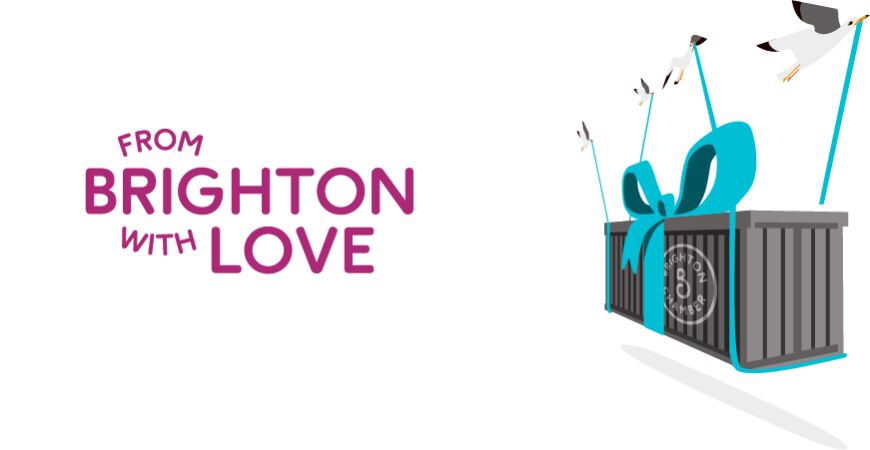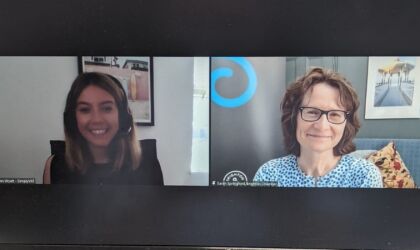

Fri 29 / 01 / 21
VAT rules post-Brexit webinar: our top takeaways
Alex Wyatt from SimplyVAT.com shares the key takeaways from their Your Questions Answered - VAT rules post-Brext webinar - part of Brighton Chamber's From Brighton with Love business support programme.
By Alex Wyatt of SimplyVAT.com
The UK’s transition period with the EU has now come to an end, a trade deal has finally been signed and businesses must now adapt to these new changes.
In our webinar with Brighton Chamber on 13 January, we covered a number of topics related to businesses' international VAT obligations when trading both goods and services between the UK and the EU.
Here are our top takeaways for your business to consider when operating post-Brexit.
Changes to Amazon's Fulfilled by Amazon (FBA) program and VAT distance selling thresholds
With the additional complexities of importing and exporting, Amazon has taken the decision to remove the UK from it’s pan-EU FBA & EFN programme. This means that stock held within FBA will no longer be automatically transported between UK & EU warehouses.
This gives sellers three main options:
1. The seller pays import VAT
Delivered Duty Paid (DDP) means you will be listed as the Importer of Record and you will be liable to pay the import VAT and duty charges. While this alleviates the customer from paying any additional charges, you will need to register for VAT in the country into which you are importing, charge the local VAT rate and reclaim any import VAT paid.
2. The customer pays important VAT
This is known as “Delivered At Place” (DAP). This will make your customers the Importer of Record and they will be responsible for paying the import VAT. This is the simplest option and doesn’t create any additional VAT responsibilities. However, it may not yield the best buyer experience as they will have to pay an additional charge and may experience delays getting goods through customs.
3. Hold stock in the EU
If you hold your stock in an EU warehouse, you will be able to continue accessing pan-EU fulfilment options and distance selling thresholds. If going down this route, you will need to manage your stock on both sides of the border to ensure you have enough to meet demand. This option will require that you register for and report VAT in the country in which you hold stock. If you need help registering for VAT, please get in touch with a member of our team.
You may now need a Fiscal Representative
In many EU countries, you will require a Fiscal Representative who will be jointly and severely liable for your VAT compliance. A full list of countries requiring fiscal representation can be found here. With added risk, fiscal representation doesn’t come free so it’s important to factor these costs into your pricing models.
Low Value Consignment Relief (LVCR) has come to an end
Previously, goods below £15 were exempt from import VAT, however as of 1 January 2021 this is no longer the case. With goods in consignments worth over £135, tax will now be due at the point of sale and not the point of import.
The value of your consignments will be very important in determining VAT treatment. See below for key changes to consignments:
Under £135
- Import VAT is no longer due at the border
- You need to charge and collect VAT at time of sale, therefore requiring a VAT registration
- It is below the customs duty liability threshold
- UK Supply VAT will be due
- If you are selling through an Online Marketplace (OMP), the OMP will be responsible for accounting for GB VAT
Over £135
- VAT will be due at the moment of import
- You will be liable for customs duties
- Import VAT is due, rather than UK supply VAT
- You will need to account for VAT in GB VAT return
Changes to VAT treatment of overseas goods sold in the UK through OMPs
If you are selling through an Online Marketplace (OMP) such as Amazon or eBay, for example, you will no longer be liable for the VAT on these sales. This responsibility now falls to the OMP. The following cases have changed:
1. If you are using a UK fulfilment centre:
- You can keep your UK VAT registration
- You will be able to reclaim import VAT paid on your VAT return
- Sales made on marketplaces are exempt from VAT, but need to be recorded on your VAT return
2. If you are drop shipping to UK customers from outside the UK:
- Consignments with value of less than £135 are charged at Point of Sale or accounted for by the marketplace if you are selling on an OMP
- Consignments over £135 are to go through normal customs procedures. Remember to bear in mind who you determine is the Importer of Record
- A VAT registration may not be required in this case
Selling through your own website?
If you sell goods through your own website to UK customers, you will be required to register for VAT. You will need to collect VAT at the point of sale if:
- Your goods are coming from a UK warehouse as an overseas seller
- Or, they are coming from outside the UK with a value of less than £135
EORI numbers for importing goods
To import goods as the Importer of Record into the UK or EU, you will be required to get an EORI number. Through your EORI number you will be able to reclaim your import VAT on your VAT return.
In addition to your GB EORI, you will also be required to get an EU EORI for the first port of entry should you wish to deliver under DDP incoterms. Waiting times for EORI numbers vary from country to country and is important to consider when planning supply chains. If you need help applying for an EORI number, we can assist you with that.
Are you selling a digital service?
If you are selling digital services, such as online music streaming or eBooks (not things such as online consulting) then you should be eligible for the VAT MOSS scheme (Mini One Stop Shop). This will allow you to streamline your VAT reporting through one country instead of every country to which you sell.
There are two types of MOSS scheme. There’s the Union MOSS scheme for EU businesses, or those with at least one branch within the EU, or the non-Union MOSS for those who aren’t based within the EU. If you are currently on the Union MOSS be sure to switch to the non-Union MOSS by the end of January.
Please note: If reporting your digital supplies under the MOSS scheme, it is important that you charge the applicable VAT rate of the country of consumption. You will need to register by the 10th day of the month following your first sale to an EU customer.
Live services
Any Live Services (defined as work that involves human interaction) will be classed as an export of services. This is outside the scope of UK VAT and you will not be required to register for VAT in the countries you are providing the service to.
You should zero rate your invoices to customers as it will be their responsibility to record this.
Hopefully this helped to navigate some of the latest Brexit changes, and how these may affect your business. It may be necessary to review and optimise your business operations as a result of the new legislation. If you have any questions or are still unsure about how the latest Brexit changes may affect your VAT obligations, please get in touch with a member of our team who will be happy to help.
Make sure to stay up to date with the latest updates to cross border trade and international VAT compliance by signing up to our newsletter. We’ve also put together a handy checklist to refer to if you are moving goods into or out of the UK. You can find the checklist here, along with lots of other useful Brexit-related resources.

With a background in Marketing and Business Development, Alex has risen to Global Project Manager at SimplyVAT.com. Her extensive knowledge of the industry and passion for empowering businesses to grow globally has made her an active member of the e-commerce community.
She has previously spoken at conferences across Europe, helping sellers to understand the ever-changing online market and vital role that VAT compliance plats in sustainable expansion.
If you want to contribute to the Chamber blog, contact us on hannah@brightonchamber.co.uk



